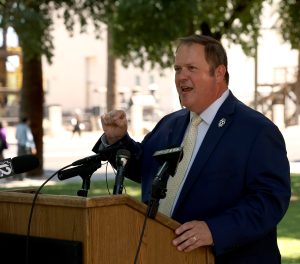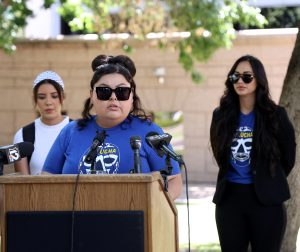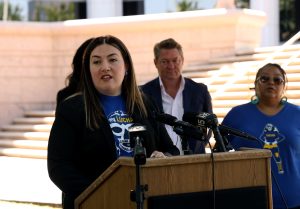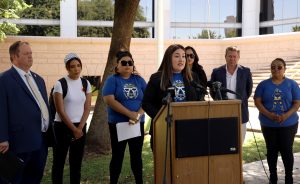- Slug: BC-CNS-HCR 2060 Lawsuit. 650 words.
- Photos available (thumbnails, captions below).
By Lauren De Young
Cronkite News
PHOENIX – In the wake of the passage of HCR 2060, Living United for Change in Arizona filed a lawsuit against the state Wednesday aiming to strike it from the ballot in November.
The lawsuit claims that House Concurrent Resolution 2060, known as the Secure the Border Act, violated the single-subject rule, which states that the measures within a bill must be united under one subject.
“This is not some mere technicality. This rule ensures that acts of the Legislature do not result in surprise from unrelated propositions that are under the same act in order to attract majority support for what would otherwise be unpopular measures,” said Jim Barton, an attorney for LUCHA.
HCR 2060, which will bypass the governor and go to voters, would make crossing the border outside of points of entry a state crime, create stricter laws around the sale of fentanyl and criminalize submitting false paperwork for public benefits or employment. The measure also would allow law enforcement to arrest those suspected of illegally crossing the border with probable cause.
The measure will go to the voters in November’s election unless it is struck down by the courts before the ballot deadline in August.
Supporters of the resolution have claimed that the federal government has not done enough to secure the Arizona-Mexico border.
“For too long, our southern border has been broken because the federal government has failed to do its job,” said Rep. Matt Gress, R-Phoenix, in a statement on the social platform X after the vote. “For too long, American citizens have lived in fear within the United States of America as the border crisis has transformed into a crime crisis.”
In response to LUCHA’s lawsuit, Gress wrote in an email to Cronkite News, “Arizonans should get a chance to decide on whether our state will put an end to open border policies coming from the federal government.”
Opponents of the measure likened it to 2010’s SB 1070, which the courts largely struck down. The provision allowed state law enforcement to determine a person’s immigration status if there was reasonable suspicion the individual could be an illegal immigrant during a lawful stop, detention or arrest.
Gina Mendez, organizing director of LUCHA, remembered when she was fighting against similar bills almost 20 years ago.
“Being here today and speaking about HCR 2060, it’s something I never imagined I would have to do. In 2006, I walked out of Cesar Chavez High School as a freshman trying to protest an immigration bill that was a precursor to SB 1070,” she said.
“We will return to the dark days of SB 1070 under HCR 2060,” she said, noting concerns about racial profiling and extremism. “Violence being unleashed under our communities is a real possibility.”
Organizations such as ACLU Arizona, Education Forward Arizona and Aliento have also spoken out against HCR 2060.
Though its journey in the courts is uncertain, LUCHA and Barton, the attorney, remained confident that HCR 2060 would be struck down.
“A judge will hear them (the defense) say every problem in the state of Arizona is caused by immigrants, and so everything, anything we do falls under the same … topic. I can’t imagine the judge will be convinced by it,” Barton said.
Even if courts do not find HCR 2060 unconstitutional, Alejandra Gomez, executive director of LUCHA, said Arizonans’ voices would be heard through voting.
“While Republicans believe this will rally their base, I can assure you that a different story will be told on the day after the election,” she said. “It will be a story of young voters rejecting cynicism and immorality. It will be a story of first-time voters casting one of the biggest votes in their lifetime. It will be the story of Latino voters mobilizing against hate, and it will be a story of abuelitas (grandmothers) voting hand in hand with their sobrinos (nephews and nieces) and grandchildren.”



